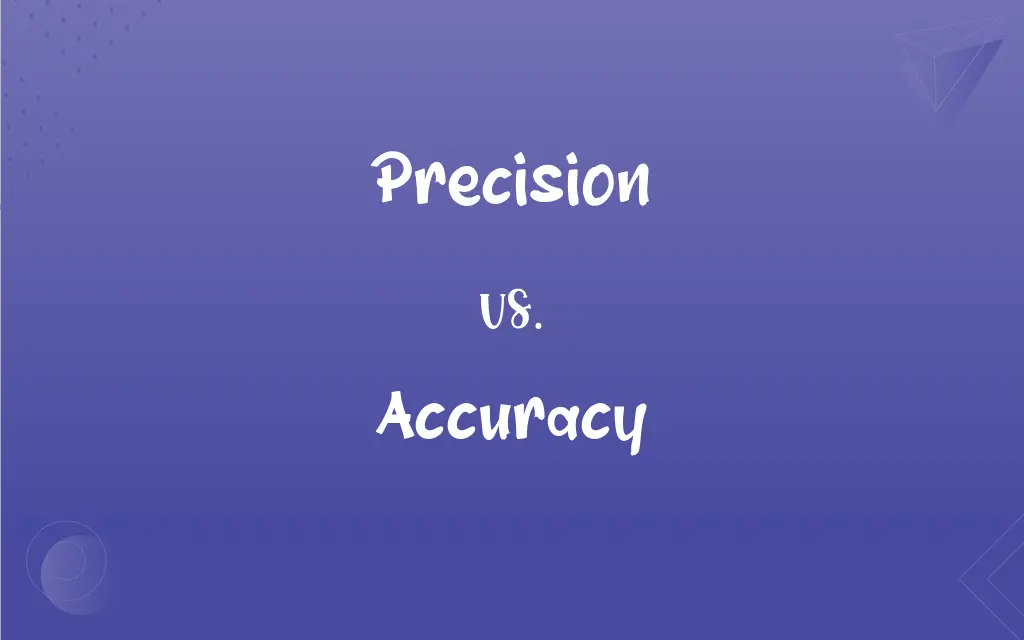Precision vs. Accuracy: What's the Difference?
Edited by Janet White || By Harlon Moss || Updated on October 6, 2023
Precision relates to the consistency of results, while accuracy refers to how close a measurement is to its true value.

Key Differences
Precision, in the context of measurement and data, refers to the degree to which repeated measurements or observations under unchanged conditions yield the same results. A method is said to be precise if the repeated measurements provide closely clustered results, even if they are far from the actual value. On the other hand, accuracy is a measure of how closely the results of a measurement conform to the true or accepted value. An accurate measurement means that there is a high degree of closeness between the measurement obtained and the true value.
It's essential to note that precision does not necessarily imply accuracy. A set of measurements can be very precise, providing very similar output in repeated trials, yet can be inaccurate, being far from the actual or accepted value. Conversely, accuracy does not guarantee precision. A measurement can be accurate, closely aligning with the true value, yet when repeated, can yield varying results, showcasing a lack of precision.
In a practical sense, precision is often associated with the concept of repeatability or reproducibility. In a manufacturing context, for example, precision might relate to producing identical items in a production run, maintaining consistency across the outputs. Accuracy, in this context, would relate to whether these items meet the specifications or desired criteria—essentially, if they are what they're intended to be.
In various fields, such as science and engineering, both precision and accuracy are paramount, but the emphasis on one over the other can depend on the particular application or objective. In some research or experiments, precision might take precedence to ensure consistent and reliable results over multiple trials. In other contexts, such as in certain types of manufacturing or in clinical settings, accuracy may be of utmost importance to ensure that outcomes meet the intended specifications or patient needs.
The concepts of precision and accuracy are particularly pertinent in the field of metrology—the science of measurement—where ensuring that instruments not only provide true measurements (accuracy) but also consistent ones (precision) is crucial for maintaining reliability in scientific research, manufacturing, and various other applications. Balancing precision and accuracy and understanding the significance and application of each ensures the validity and reliability of measurements and outcomes in various disciplines.
ADVERTISEMENT
Comparison Chart
Definition
Consistency of results in repeated measures
Closeness of a measurement to its true value
Implication
Repeatability and reliability
Veracity and correctness
Visualization (Target Analogy)
Tight grouping of arrows, not necessarily at the target’s center
Arrows scattered but averagely centered around the target
Relevance in Manufacturing
Producing identical items consistently
Ensuring items adhere to specified criteria
Importance in Metrology
Ensuring measurements are repeatable
Ensuring measurements are true and correct
ADVERTISEMENT
Precision and Accuracy Definitions
Precision
Precision refers to the repeatability of a set of measurements under unchanged conditions.
The scientist emphasized precision by ensuring the experiment was repeatable with consistent results.
Accuracy
Accuracy refers to the extent to which a measured value conforms to the actual standard or true value.
The accuracy of her statement was confirmed when subsequent events unfolded just as she predicted.
Precision
Precision denotes the degree of variation among repeated measurements or outputs.
Despite achieving precision with similar results, the experiment lacked accuracy, veering from the expected outcome.
Accuracy
Accuracy pertains to the degree to which an instrument or process reflects the real value.
Due to its high accuracy, the laboratory scale is able to detect minute changes in weight.
Precision
Precision is an indication of the stability or reliability of a measurement or method over multiple iterations.
His precision in crafting each piece ensured a consistent and reliable product line.
Accuracy
Accuracy denotes how close a measurement is to the true or accepted value.
The thermometer showed great accuracy by reflecting the standard boiling point of water at 100°C.
Precision
Precision pertains to the tightness of the distribution of values around a certain point, not necessarily the true value.
The marksman displayed remarkable precision, with all shots landing closely together, though not at the target's center.
Accuracy
Accuracy implies the correctness or exactness of a particular measurement or statement.
His historical novel was praised for its accuracy in depicting medieval life.
Precision
Precision is the consistency in the results obtained from repeated procedures or measurements.
The precision of the manufacturing process was evident in the uniformity of all produced units.
Accuracy
Accuracy involves minimizing the discrepancy between a measurement and its true or accepted value.
The experiment was repeated several times to validate the accuracy of the results.
Precision
The state or quality of being precise; exactness.
Accuracy
Conformity to fact.
Precision
The ability of a measurement to be consistently reproduced.
Accuracy
Precision; exactness.
Precision
The number of significant digits to which a value has been reliably measured.
Accuracy
The ability of a measurement to match the actual value of the quantity being measured.
FAQs
How is accuracy defined in measurements?
Accuracy refers to the closeness of a measurement to its true or accepted value.
Why is precision important in scientific experiments?
Precision ensures reliability in results and helps validate the repeatability of an experiment.
In which fields are precision and accuracy critically important?
Both are vital in numerous fields, including medicine, engineering, science, manufacturing, and finance.
What does precision mean in a scientific context?
Precision relates to the consistency and repeatability of measurements under unchanged conditions.
Why is accuracy significant in clinical measurements?
Accuracy in clinical measurements is crucial for correct diagnoses and appropriate therapeutic interventions.
In what scenarios is accuracy more vital than precision?
In scenarios like medical dosages or navigational calculations, accuracy might be prioritized to avoid harmful outcomes.
How can accuracy be compromised in measurements?
Accuracy can be compromised by systematic errors, instrument calibration issues, or incorrect methodology.
How can precision be quantified or evaluated?
Precision is commonly evaluated through statistical metrics like standard deviation or variance among repeated measurements.
Is it possible for a method to be both precise and accurate?
Yes, a method can yield results that are both consistent (precise) and close to the true value (accurate).
How is accuracy different from trueness?
Trueness refers to the bias (systematic error) in measurements, while accuracy encompasses both bias and random error.
Is there a visual tool to understand accuracy and precision?
Yes, a common visual tool is a target diagram, where accuracy is how close shots are to the center and precision is how close shots are to each other.
How can accuracy and precision be optimized together?
Optimizing both involves minimizing systematic and random errors through calibrated instruments, controlled conditions, and validated methods.
Can a result be considered accurate with a single measurement?
A single measurement can appear accurate, but multiple measurements are needed to validate consistency and reliability.
Can accuracy be improved using precision?
Improved precision can identify systematic errors (enhancing accuracy) by revealing consistent deviations from the true value.
Can a measurement be precise but not accurate?
Yes, a measurement can be precise (consistent) without being accurate (correct).
Can an instrument be accurate without being precise?
Yes, an instrument may provide measurements close to the true value (accurate) but with high variability (not precise).
How is accuracy tested or validated?
Accuracy is often validated by comparing measurements against known standards or accepted values.
Is precision more important than accuracy in manufacturing?
It depends; precision ensures product uniformity, while accuracy ensures adherence to specifications—both can be vital.
Does precision relate to the sensitivity of an instrument?
Not directly; while precision relates to consistency, sensitivity refers to the instrument's ability to detect small changes.
How can precision be improved in measurements?
Precision can be improved through consistent methodology, controlled conditions, and utilizing reliable instruments.
About Author
Written by
Harlon MossHarlon is a seasoned quality moderator and accomplished content writer for Difference Wiki. An alumnus of the prestigious University of California, he earned his degree in Computer Science. Leveraging his academic background, Harlon brings a meticulous and informed perspective to his work, ensuring content accuracy and excellence.
Edited by
Janet WhiteJanet White has been an esteemed writer and blogger for Difference Wiki. Holding a Master's degree in Science and Medical Journalism from the prestigious Boston University, she has consistently demonstrated her expertise and passion for her field. When she's not immersed in her work, Janet relishes her time exercising, delving into a good book, and cherishing moments with friends and family.































































